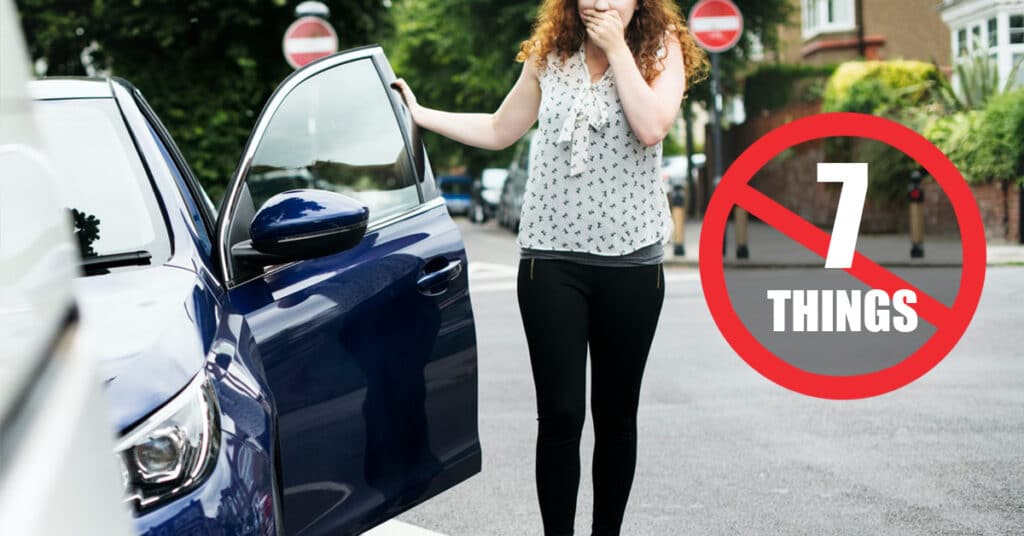Hello and welcome to our website! We’ll assume that you are here looking for legal advice, you’ve been in an accident or you’re looking for something interesting to read. Here’s something you may not know but should. Whether you’ve already been in an accident or never had one, here are some general ideas on how to handle any auto-related mishaps that may interrupt your otherwise smooth day.
There are plenty of articles about what to do after you’ve been in an auto accident, but what about what NOT to do? It’s just important than the what-to-do list and could potentially save you a lot of legal headaches when you realize you’ve been injured.
Here’s what NOT to do:
1. “I’ll take it…”
So, you’ve just had an accident that’s not your fault. Your insurance or the other driver’s insurance contacts you with a settlement offer. Don’t be quick to accept, most insurance companies want to settle your claim as quickly as possible, so, they’ll offer you the absolute minimum available. Is that working to your benefit? Not so much. It’s working to their benefit. The best thing to do is consult an attorney with experience and knowledge to come up with a fair settlement. Otherwise, you may be stuck with some expenses that weren’t yours to pay.
2. “This is what I think…”
After your fender bender, there will be many questions and you’ll be asked for your statement numerous times. You’ll be asked by the police, your insurance company, and possibly the other driver’s insurance company. Don’t be overwhelmed by your new popularity. Embellishing or speculating may result in false information that will damage your claim and or your account of what occurred. Stick to the facts, and don’t worry, if you can’t answer a question, it’s better to respond with, “I don’t know,” and leave it at that.
3. “I’m Not Hurt”
“Nope, I’m fine.” Don’t brush off your possible injuries with your words. Adrenaline and shock will mask some injuries. There are several injuries common with collisions that don’t show up right away. Examples include whiplash, traumatic brain injuries (TBI), and other invisible injuries. If you feel you have any of these injuries, consult your physician or go to the emergency room immediately. Don’t try walking it off, the results won’t achieve the desired effect. Insurance settlements resulting from accidents are almost completely based on injuries sustained from the accident. It would also be best not to discuss your injuries on social media. Especially if it doesn’t match your medical records.
4. “I don’t need an attorney…”
Even if you are not working with an attorney, it’s best not to advertise it. An insurance company will possibly ask if you are retaining legal representation. If you have representation, provide the name of the attorney or the firm that represents you.
If you don’t have one, respond that you are currently considering your options. Most attorneys offer free consultations, so before you decide you’re able to toss in enough legal jargon to make it through the paperwork, it’s best to consult the people who know all the legal jargon to ensure you aren’t agreeing to an unfair settlement.
5. “Awe, geez! I’m so sorry.”
So, you think the accident may be your fault. You check on the other driver and blurt out “I’m sorry!” No, you’re not. What we mean is, don’t apologize. We use these words to defuse situations in our lives, but in this case, it could imply an admission of guilt. Resist the urge. Be kind and calm. Wait for the police and emergency services. And keep reading, #6 will explain further.
6. “Oops! My bad…”
Stop. Like any pothole in the road, you should steer clear of any admission of fault. Everyone involved has a different idea of what happened in the incident. You’re admitting to something that may be false without meaning too. It could result in a traffic ticket or the outcome of your claim. Also avoid other admissions of fault like, “I didn’t even see you”, “I shouldn’t have been looking at my phone.” or “I’m sorry.”
7. “Making an official statement…”
We also mentioned already in the second point, you’ll be asked a copious amount of questions about the accident itself. These answers and the statements of witnesses are considered the primary records taken on the scene, and they are important to the claims process. There is something a little different than those records, and that would be your “official statement.”
The “official statement” is different than the questions answered after the accident. It’s also a big part of what will be used in future proceedings. If you are unsure of how to make or put together this statement, it’s important to consult an attorney before making it. They will have the know-how to put it together to benefit your needs and the outcome of your legal process.
Did you get injured in an accident? We’ll get you the compensation you deserve.
NO FEE until we win! Call 248-591-4090 today!
Now, here’s what you should do after being injured in an accident:
If you need an experienced attorney, please don’t hesitate! Call or contact us for a FREE consultation at the The Lobb Law Firm. You can find us at www.thelobblawfirm.com

